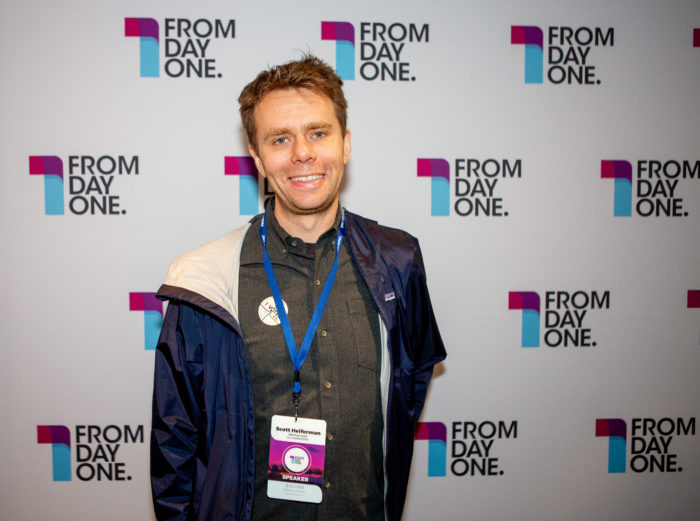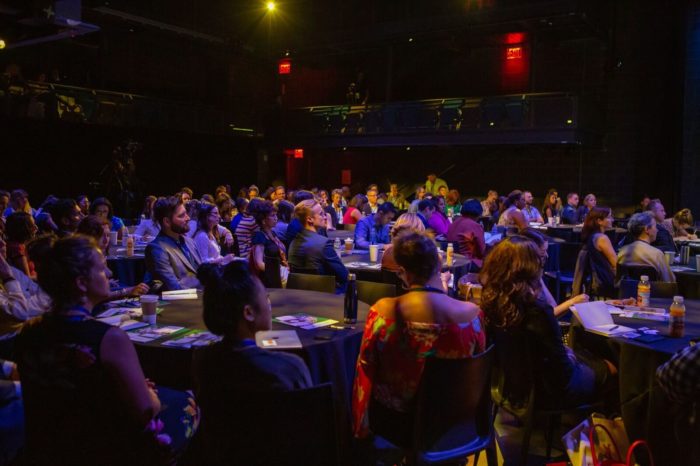As participants in the From Day One conference were just getting comfortable inside the auditorium at Brooklyn’s BRIC House, Nick Baily, a conference co-founder and chief of the digital marketing agency Complex Ventures, took to the stage.
“In the world of business, authentic values matter—a lot. They’re essential,” said Baily. “Values are a statement about what we consider important, about how we make choices”
And with that, the main theme of the conference, co-produced by The Bridge and featuring more than 30 speakers from the worlds of advertising, journalism, tech, real-estate development and politics, was established.
Baily introduced journalist Gabriel Snyder, who was tasked with interviewing Scott Heiferman, the founder of Meetup, the digital event-planning platform that has signed up 100 million people. On cue, the pair leapt directly into a discussion about the company’s values and how they’re reflected in its mission to this day.

Heiferman started Meetup as a response to 9/11
“Meetup is just trying to bring people together in real life to create real communities,” Heiferman said. Alluding to the divisiveness that’s proliferating in so many parts of the globe, spurred by widening gaps in political ideologies, Heiferman said of his company: “We’ve got this dream of the world being, frankly, less like it is right now, and less than what it seems to be becoming. … When people meet up, the better parts of themselves come out, and they’re more powerful.”
Since Meetup’s launch 16 years ago, the company’s core mission has remained intact, Heiferman said, in spite of many changes that have come to the organization’s approaches and strategies. Heiferman noted that some have suggested the site expand its capabilities and host virtual meetups, where groups interact via webcam. But in spite of the importance of that technology, Heiferman said, Meetup doesn’t want to stray too far from its founding principles, forged in the aftermath of 9/11.
At the time of the terror attack, Heiferman had lived for awhile in an apartment building at Elizabeth and Houston streets in Downtown Manhattan. He knew none of his neighbors, but they gathered together on the building’s rooftop to witness the catastrophic event.
“Long story short, I talked to my neighbors,” Heiferman said. “In the hours and days and weeks afterward, people would say hello to each other in the elevator, and there are very specific stories of people looking out for each other, actually caring for each other, face to face.”

The From Day One conference drew more than 300 participants to BRIC House in Downtown Brooklyn
Within a few weeks Heiferman and three friends hatched the Meetup concept. “We had a design goal, which was to use the internet to get people off the internet,” he said. The site went live just under nine months after the attack.
“To the question of ‘How do you persist for a long time?’, well, there’s just a simple, meaningful purpose,” Heiferman said of Meetup. “It’s not that hard to be unwavering, so long as you can make it a viable business.”
He also noted that, in staying true to the company values spawned of his 9/11 experience, Meetup has decided over the years not to exploitatively sell ads or user data. (Revenue comes from tiered event-organizer subscriptions with different service levels.)
By many measures, such company policies have proven to be a wise strategy, affirmed by the $200 million purchase of Meetup last November by WeWork, the community office and housing giant. Heiferman remained CEO of Meetup until July, when he shifted into a chairman role. He told the From Day One audience that the sale made sense, not only from a financial perspective.
“I’m a big stickler for shared vision, shared dream, shared purpose,” Heiferman said. “We locked on to this notion of a physical social network—that Meetup has community that needs space [and] WeWork has space that needs community.” He hopes such a move helps keep people from retreating to a “Netflix universe.”
“The fact that we have this shared vision of more physical community in the world,” Heiferman said of Meetup and WeWork, “just gives us leeway to … hopefully be stronger together.”
His dream, he said, is for the relationship of Meetup to WeWork “to be like Instagram to Facebook or YouTube to Google. There’s been some challenges, but thankfully we all want the same thing.”